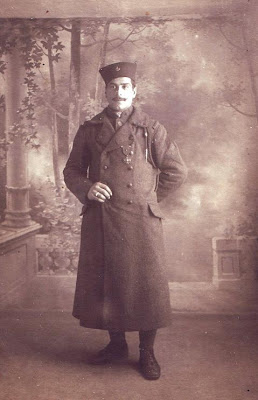 Had these photos from Patrick of his relatives around the time of the Great War. I wish I had photos like these of my ancestors. Patrick says
Had these photos from Patrick of his relatives around the time of the Great War. I wish I had photos like these of my ancestors. Patrick saysTwo others photos of the great uncle in Zouaves
- 1st is from January 1st 1917 in winter uniform
- 2nd just after the war in 1919 with his two brothers , Louis (in the navy) and Charles (chasseurs à pieds)
hope you enjoy ...
Patrick
_de_Sans_titre-Num%C3%A9risation-01(2).jpg)


It is sobering to note that Patrick’s chasseur great uncle is wearing no fewer than five chevrons of presence at the front on his left sleeve. One chevron was awarded for one year’s service in the zone des armées, and another for each subsequent six months. Thus five chevrons means three completed years’ service at the front.
ReplyDeleteGiven that the chasseur battalions were élite formations, accustomed to the thick of the fighting and suffering correspondingly high casualties, this gentleman must be considered very lucky to have survived the war, as no doubt were his brothers.
We should be humbled when we think of the service and sacrifice of men like these. Vulgar and ignorant comments in the Anglo-American media about “the cowardly French” make me very angry.
you're right Charles,
ReplyDeletean error from me, the chasseur's name is Louis not Charles, the sailor 'name is Jules, the zouave is Léon.
the chasseur (Louis) was affected to the 120th bataillon created in march 1915 at Fennery le grand with some parts of 1st, 2nd, 4th, 17th, 18th et 20th BCP. he fight in France from 1915 to 1918 and disbanded at Sarreguemines in may 1919.
the great uncle is sergeant. he wear the Croix de guerre 1914/1918 with one citation .
actions with the 120e chasseurs during WW1
1915
Alsace : Reichacker, Lac Noir, Linge
Champagne : Bois des Bouleaux, nord ouest de Souain
Lorraine
1916
Vosges (Wissembach)
Verdun : Bois d'Haudremont, reprise des Forts de Douaumont et de Vaux, Thiaumont
Bois-le-Prêtre
Somme : Barleux
1917
Vosges : Senones
Chemin des Dames : Le Panthéon (juin), Vauxaillon (13 août), Mont des Singes
Aisne : La Malmaison (fin octobre)
Haute-Alsace
1918
Haute-Alsace
Belgique : Kemmel
Flandres : Scherpenberg (20 mai)
Courcelles
Aisne
Oise: Guiscart (10 août)
Lorraine